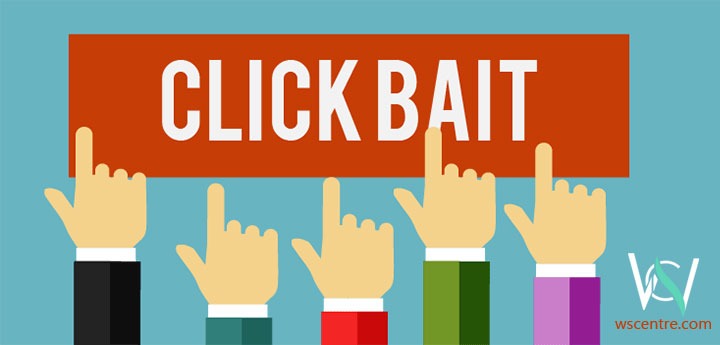
The online marketers of a highly competitive Dubai Web Design Agency today in this blog would like to enlighten all its readers about the mystery behind those “larger-than-life” and sensational headlines that you simply can’t resist opening. These headlines, in reality, do nothing for you and everything for the website owners who have them published on their websites. We are talking about the most prevalent yet misleading web practice that is plaguing the web world heavily – Clickbait. What does it mean? We’ll tell you.
What is Clickbait?
Clickbait is a derogatory term used to describe online content or posts that with the help of sensational headlines and small text descriptions try to lure people into clicking the link so that the person is directed to the original web article at the source publication. Clickbait content spreads easily and goes viral through social media sites like Facebook and Twitter. The primary motive behind Clickbait content is to fully exploit the “curiosity gap” to make people eager and intrigued by providing just enough content to ring their bells but not enough information to satisfy their curiosity.
Clickbait content tends to hike up everyone’s curiosity by making headlines so catchy that people get influenced and motivated into reading what comes next. Clickbait content makes a splash with headlines like “You won’t believe” or “What happened next will shock you,” and other open-ended assertions that will definitely spark your ever-loving inquisitiveness into a click.
Why it works, SOMETIMES?
Clickbait content is structured in a way that it taps the psychological characteristic in the human brain. Clickbait seems to work effectively and successfully sometimes because they leave the key information, only giving a glimpse of what’s next to come. This eagerness to know more makes the reader into clicking the original web article at the source publication which sometimes proves to be useful and sometimes comes across, as the name suggests, as bait which has nothing but nonsense sub-standard and irrelevant content.
Why companies employ Clickbait titles?
The answer is quite simple and pretty obvious: More clicks = more page visits = more money from advertisements.
Why should you Steer Clear of it?
Google is the king of algorithms when it comes to selecting websites deserving of the top search engine result pages and the master of providing only quality content to the searchers. Every few months Google gets down to the task of molding its search algorithm so that it can sift through clickbait, duplicate content and fake news and in return punish the website indulged in these black hat practices by either banning them completely or pushing them further down the results pages.
Also, search engines look for certain key metrics as part of their criteria before ranking the websites. Clickbait content pages have a higher percentage of bounce rate because the moment users land onto the original web article and notice that the content is completely sub-standard and irrelevant they bounce back immediately from the website without sparing another glance to it.
Now, bearing this in mind, think twice is it worth wasting your time and resources on Clickbait advertising?
 Request A Quote
Request A Quote
 Have a project in mind? Get in Touch
Have a project in mind? Get in Touch